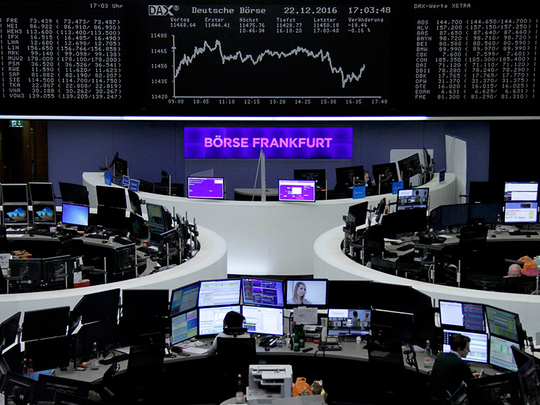
LONDON: European stocks edged higher on Friday, helped by banks after two regional bellwethers settled investigations into US mortgage securities, while oil and the dollar were on the back foot in light trading ahead of the Christmas break.
In another boost to European financials, a bailout for Italy’s oldest bank Monte dei Paschi was approved as the country’s government looks to end a protracted banking crisis that has gummed up the economy.
Futures on Wall Street pointed to a flat open.
European shares were up 0.1 per cent with Eurozone banks up 0.6 per cent and comfortably outperforming broader markets. An index of Italian lenders rose by 1.6 per cent.
While Monte dei Paschi shares were suspended from trading, Italian government bond yields fell with 10-year yields slipping 4 basis points to 1.81 per cent.
“Banks run the show today,” analysts at Kepler Chevreux said in a note to clients, adding that the newsflow around Italian lenders was turning positive.
Deutsche Bank’s $7.2 billion settlement with the US. Department of Justice (DOJ) over toxic mortgage securities sold in the run-up to the 2008 financial crisis was nearly half of the fine initially levied in September. Deutsche Banks shares rose 2.7 per cent and are up 86 per cent since September lows.
Credit Suisse fell 0.6 per cent, giving up earlier gains, after it agreed to pay $5.3 billion to the DOJ to settle similar charges. Barclays became the latest in a longlist of other lenders under investigation to be sued.
Elsewhere, markets were quiet, with UK markets closing at midday.
The dollar headed into the Christmas break on Friday just over half a per cent off highs hit after this month’s US.
Federal Reserve policy meeting.
The dollar is up more than 7 per cent against a basket of currencies since lows hit on US election night in November but has been flat for the past week.
The dollar index, hovering near a 14-year high, was marginally lower at 103.03 but remained within striking distance of the week’s 103.65 peak.
“My overall sense is that we’ll start the year eking out further gains from the post-Trump trends, before we get a change of tack,” said Societe Generale strategist Kit Juckes.
The euro was also a shade firmer at $1.0440, having rebounded only modestly from a nearly 14-year low of $1.0350 set earlier in the week.
Sterling headed for its biggest weekly fall in almost three months on Friday, although data showing that the British economy grew faster than expected in the third quarter helped lift it from a seven-week trough against the dollar.
The UK economy expanded at a 0.6 per cent pace in the three months to September, faster than the original estimate of 0.5 per cent, suggesting there has been no “Brexit” hit to economic activity so far since the June 23 vote to leave the European Union.
Oil prices slipped, eroding some of the gains in the previous session as traders took profits.
Brent crude for February delivery dropped 36 cents, or 0.7 per cent, to $54.69 a barrel after ending 1.1 per cent higher on Thursday. US. West Texas Intermediate crude fell 39 cents, or 0.7 per cent, to $52.56 a barrel after gaining 0.9 per cent in the previous session.












